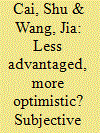| Srl | Item |
| 1 |
ID:
149994


|
|
|
|
|
| Summary/Abstract |
Coal is one of the main fuel sources in China. This paper sheds light on the evolution of China's interregional differences in CO2 emissions from coal by constructing a Gini coefficient and decoupling elasticity index for emissions from 1997 to 2012 and explains why emission differences deviate from economic growth differences. The study decomposed the Gini coefficient of CO2 emissions from coal by source, incremental source, and region. It also divided the decoupling elasticity of carbon emissions into two components: effects of environmental expenditure and effects of emission reduction policy. The findings of the study are as follows: First, interregional differences in China's overall CO2 emissions from coal are characterized by periodic fluctuation. Second, the differences in emissions from raw coal, the concentration effect of emissions, and the emission differences within regions are the three main factors in the overall difference changes in coal's carbon emissions in China. Last but not least, the decoupling between provincial CO2 emissions from coal and economic growth is on the whole weak. Based on the above findings, the author offers four suggestions for emission reduction.
|
|
|
|
|
|
|
|
|
|
|
|
|
|
|
|
| 2 |
ID:
163334


|
|
|
|
|
| Summary/Abstract |
Using a recent national dataset from the China Family Panel Studies, this study provides new evidence regarding the subjective well-being puzzle across multiple indicators among rural, migrant and urban populations in contemporary China. The results show that rural people on average have higher levels of life satisfaction than do migrants or urban residents, despite their disadvantaged economic situations. The decomposition analyses reveal that subjective social status plays a substantial role in accounting for group disparities in life satisfaction, whereas objective social status and experiences of social mobility have less explanatory power. These findings suggest the importance of within-group comparison in shaping individuals' well-being in segregated societies such as China.
|
|
|
|
|
|
|
|
|
|
|
|
|
|
|
|